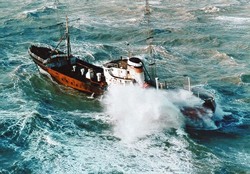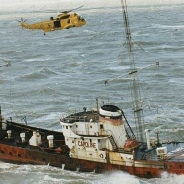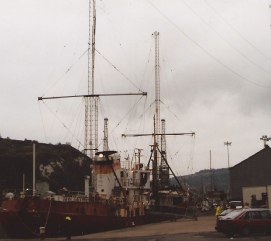© 2014-


Radio Caroline 1980s - History (16)
At 6.25am they reluctantly decided there was no alternative but to abandon ship. Ramsgate lifeboat arrived on the scene shortly afterwards, but itself ran aground on the treacherous sands and Dover lifeboat then had to be launched to assist both stranded ships. Shell supertanker, Shell Marketer, which was in the vicinity at the time also stood by to provide assista nce.
nce.
By 6.57am the  RAF helicopter had returned and landed on the stern deck of the Ross Revenge. In a ten minute operation the helicopter airlifted the six crew members off in pairs and took them to RAF Manston. The Dover Harbour Board tug Dextrous remained on stand-
RAF helicopter had returned and landed on the stern deck of the Ross Revenge. In a ten minute operation the helicopter airlifted the six crew members off in pairs and took them to RAF Manston. The Dover Harbour Board tug Dextrous remained on stand-
The Ross Revenge managed against all odds to remain upright on the Goodwin Sands, but first attempts to get a line aboard the stranded radio ship later on 20th November 1991 were unsuccessful. It was not until the following morning that the Dextrous managed to land a salvage crew on the Ross Revenge and secure tow lines to her. Even with these lines in place it proved difficult to remove the radio ship from her position on the sandbank -
The Ross Reven ge, one of only a handful of vessels ever to have been rescued intact from the Goodwin Sands, was then towed to Dover where she arrived late in the afternoon of 22nd November 1991. The ship was immediately impounded by the authorities and, following an inspection by marine surveyors, was declared unseaworthy by the Department of Trade who identified a long list of repairs which would have to be completed before the ship could be released. Radio Caroline management and the Ross Revenge Support Group immediately entered into negotiations with Dover Harbour Board over the salvage costs for recovering the Ross Revenge, but with the vessel now in port and under official control it seemed at the time that the life of the most famous station in British offshore radio history had come to an end. A caretaker crew of Caroline personnel were later allowed on board the ship by Dover Harbour authorities.
ge, one of only a handful of vessels ever to have been rescued intact from the Goodwin Sands, was then towed to Dover where she arrived late in the afternoon of 22nd November 1991. The ship was immediately impounded by the authorities and, following an inspection by marine surveyors, was declared unseaworthy by the Department of Trade who identified a long list of repairs which would have to be completed before the ship could be released. Radio Caroline management and the Ross Revenge Support Group immediately entered into negotiations with Dover Harbour Board over the salvage costs for recovering the Ross Revenge, but with the vessel now in port and under official control it seemed at the time that the life of the most famous station in British offshore radio history had come to an end. A caretaker crew of Caroline personnel were later allowed on board the ship by Dover Harbour authorities.
Irrepressible as ever Radio Caroline did manage to bounce back less than a week after the Ross Revenge had run aground, on 27th November 1991, although not from an offshore base. Radio Caroline returned on satellite using some free air time donated by a Dutch station, using the facilities of the Intel satellite. Radio Caroline programmes were carried on this facility from Monday to Thursday between 9.00 and 10.00pm, with an overnight service on Friday night/Saturday morning.
Another outlet for Radio Caroline was found at Radio 6 in Calais when on 1st December 1991 the local French FM station presented a three hour "Caroline Special", including contributions from some Caroline DJs recorded on board the Ross Revenge in Dover Harbour.
Potential audiences which could be attracted by both these outlets were small -
1992
The Dutch Ministry of Justice announced on 21st September 1992 that no charges would be brought against Dutch or British nationals arising from the raid on the Ross Revenge in August 1989. The Ministry also agreed to return to Radio Caroline all broadcasting equipment and records seized during the raid, instead of disposing of the items by public auction as had been the original intention. This offer was made following discussions Station Manager Peter Moore had held with Marten Roumen, (the Dutch policeman who led the raid on the Ross Revenge and who was a self-
1993
All equipment confiscated by the Dutch during the raid on the Ross Revenge in 1989 was collected early in January 1993 following the abolition of restrictions on the free flow of goods between member states of the European Union., The studio and broadcasting equipment was eventually re-
Radio Caroline is still broadcasting today -

Ross Revenge stranded on Goodwin Sands, November 1991
Ross Revenge on Goodwin Sands being buffeted by large waves.
Sound track from Media Network, Radio Netherlands English Service 21st November 1991

Click on picture to enlarge

The Sun
21st November 1991

Liverpool Daily Post
21st November 1991

Dover Express
29th November 1991
Ross Revenge in Dover, December 1991

History
Key Dates
Ship and Location
Technical
Staff
Programmes





RAF helicopter rescues the crew from the Ross Revenge,
20th November 1991
Treasure Chest





Back to Britain Gallery


Back to Radio Caroline 1980s

